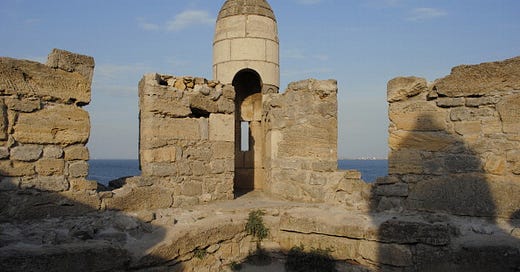This lecture focuses on the transition from war to postwar in the Soviet Union. The Holocaust, the murder of Ukraine’s Jews by the Germans and by local collaborators, changed the population structure of the country, as did ethnic cleansing by Ukrainian nationalists and wartime and postwar Soviet policies of ethnic cleansing. Territory that had been in Poland, Czechoslovakia, and Romania was annexed by the USSR, creating a larger Soviet Ukraine. The republic as a whole, however, was treated with suspicion by Stalin and the postwar leadership. Although Ukrainians suffered more than Russians under German occupation, and although Russians were no less likely to collaborate than Ukrainians, Stalin defined Russians as the heroes and the Ukrainian republic as a terrain of risk. Although Ukraine was actually Hitler’s main target, Stalin created propaganda stereotypes that could suggest, when politically useful, that Ukrainians had been on the wrong side of the war. Although there were also Russian nationalists fighting on the side of the Germans, Stalin made of “Ukrainian nationalism” a weapon for the continued punishment of the republic. The Russians were to be the main victors and the main victims, a stereotype that redounds down the decades to this day. Stalinist russocentrism was meant as a weapon of centralization and the restoration of Stalinism after the war; it is a tool of militarism and imperialism now. No one would recall that more Ukrainians died fighting the Germans than Americans, British, and Frenchmen — taken together. Ukrainian culture was again suppressed; contained as it was now almost entirely in the USSR, it became largely invisible.

The video is here and the podcast version is here or here. This is lecture number 17, despite the different title that might be given on those websites.
Reading:
Plokhy, Gates of Europe, chapter 24.
Yekelchyk, Ukraine: Birth of a Modern Nation, chapter 9.
Terms:
Nikita Khrushchev
Leonid Brezhnev
OUN: Organization of Ukrainian Nationalists, Bandera, Melnyk
UPA: Ukrainian Insurgent Army
Galicia, Volhynia
Cheka
Dekulakization
Deportations by Cheka, apparatus
Dekulakization, peasant action
Poles, Latvians, Koreans 37-38
March 1944 180,014 Crimean Tatars to Uzbekistan
Molotov-Ribbentrop pact
Subcarpathian Ruthenia, Czechoslovakia
Chernivtsi, Romania/Northern Bukovina/Paul Celan
Galicia and Volhynia
Galicia: Habsburgs and then Poland
Volhynia Poland
Urbanization




What "ethnic cleansing by Ukrainian nationalists?" What about Operation VIstula?